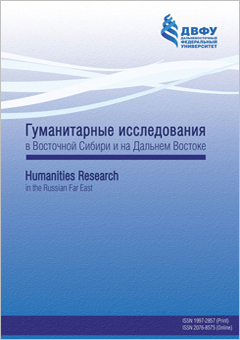Russian thought of the 17th and 18th centuries on the Slavic homeland
DOI:
https://doi.org/10.24866/1997-2857/2024-2/104-110Keywords:
Russian philosophy, Russian history, Slavic homeland, national ideologyAbstract
The article presents an overview of the views of Russian thinkers of the XVIIth and XVIIIth centuries on the issue of the Slavic homeland. The author examines the Danube basin hypothesis («Russian Primary Chronicle»), which dominated Russian historical thought from XIIth to XIXth centuries, the hypothesis of the missing homeland (I. Giesel), the Asia Minor hypothesis (V.N. Tatishchev, M.V. Lomonosov) and notes that in the XVIIIth century historical thought of Russia the issue of the Slavic homeland had no independent significance and was treated within the more politically relevant issue of the origin of Russian state.
Downloads
References
Байер Г.З. Сочинение о варягах. СПб.: Императорская Академия наук, 1767.
Ломоносов М.В. Возражения на диссертацию Миллера // Ломоносов М.В. Полное собрание сочинений: в 11-ти т. Т. 6. М.; Л.: Изд-во АН СССР, 1952. С. 25–42.
Ломоносов М.В. Древняя российская история от начала российского народа до кончины великого князя Ярослава Первого или до 1054 г. // Ломоносов М.В. Полное собрание сочинений: в 11-ти т. Т. 6. М.; Л.: Изд-во АН СССР, 1952. С. 163–286.
Ломоносов М.В. Отзыв о «Русской грамматике» А.-Л. Шлёцера. 1764, августа // Ломоносов М.В. Полное собрание сочинений: в 11-ти т. Т. 9. М.; Л.: Изд-во АН СССР, 1955. С. 426–427.
Мечта о русском единстве. Киевский синопсис (1674). М.: Европа, 2006.
Миллер Г.Ф. О происхождении имени и народа российского // Фомин В.В. Ломоносов. Гений русской истории. М.: Русская панорама, 2006. С. 366–398.
Младшая Эдда. М.: Наука, 1970.
Орбини М. Славянское царство. М.: ОЛМА Медиа групп, 2010.
Петрей П. История о великом княжестве Московском // О начале войн и смут в Московии. М.: Фонд Сергея Дубова; Рита-Принт, 1997. С. 151–464.
Повесть временных лет. СПб.: Наука, 1996.
Сказание о князьях Владимирских // Библиотека литературы Древней Руси: в 20-ти т. Т. 9. СПб.: Наука, 2000. С. 278–289.
Татищев В.Н. Собрание сочинений: в 8-ми т. Т. 1. История Российская. Ч. 1. М.: Ладомир, 1994.
Шлёцер А.Л. Нестор. Руския летописи на древле-славенском языке. Ч. I. СПб.: Императорская типография, 1809.
Шнирельман В.А. Арийский миф в современном мире. Т. 1. М.: Новое литературное обозрение, 2015.
Downloads
Published
Issue
Section
License
Copyright (c) 2024 Олег Анатольевич Матвейчев

This work is licensed under a Creative Commons Attribution-NonCommercial-NoDerivatives 4.0 International License.














